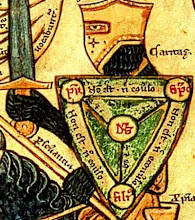 |
Eastern Orthodox icon depicting the First Council of Nicea
(From Wikipedia) |
“...the world was not worthy of them.” (Hebrews 11:38a, NIV)
We already saw in the previous article that major church councils such as the First Council of Nicea did not devise the doctrines about Christ but only defined and defended His deity, His humanity and how the two natures relate with one another.
We must also distinguish between what really happened and what we think happened, that is, between the event and our interpretation of the event. It's much like the difference between straight news and commentary.
For example, the Iglesia ni Cristo (INC) claimed that the Council of Nicea gave in to “the whims of the emperor”[1] out of “utang na loob” (“debt of gratitude”). That the bishops compromised their convictions due to the comfort they enjoyed during the Council.
With all the amenities and favors so lavishly showered by Emperor Constantine to the bishop delegates of the council, they became indebted to him. As expressions of their gratitude to the emperor, they yielded to his demands.[2]
The INC based their claim on a quote from “A Short History of Christian Doctrine” by Bernhard Lohse: “It is understandable if the bishops showed their gratitude by generous efforts to oblige the emperor.”[3] Note how the INC changed the meaning of what Lohse wrote.
He merely wrote, “It is understandable if the bishops showed their gratitude…” (Emphasis mine) That does not necessarily mean that they actually obliged the emperor out of gratitude to him. It seems to be merely hypothetical as far as Lohse is concerned, and not actually historical. But, the INC already made it appear that the bishops became beholden to the emperor.
It is a fact that the emperor lavished the bishops “with all amenities and favor.” But it does not necessarily follow that the bishops felt obliged to him.
To set the record straight again, neither pampering nor pressure made the bishops take a stand for the deity of Christ. They acted on their principles, not on imperial politics. Almost all of them suffered, losing limbs and almost their lives, in the cruel hands of the wicked Emperors Diocletian and Maximian.
The bishops at Nicea were more accustomed to persecution than pampering. … The marks of persecution were so prevalent that one ancient writer said, “The council looked like an assembled army of martyrs!” Of course, men who had suffered such physical injuries for the sake of spiritual integrity were not about to be told what they should believe about Christ—imperial pressure or not. Indeed the bishops at Nicea were more preoccupied with preaching than politics. … Constantine knew that whatever solution came about would have to reckon with the deeply held convictions of the majority of bishops and the churches they represented.[4]
Considering the persecutions these bishops endured before the reign of Constantine, it is more probable to believe that they acted out of conviction rather than compromise in the Council of Nicea.
It seems that, despite their efforts to prove their bias that the Council made Christ equal with God, there is really no truth to the accusation of the INC that “this doctrine was formulated not because of biblical merits but because of the whims of the emperor”.[5]
To suggest that Constantine had the ability—or even the inclination—to manipulate the council into believing what it did not already embrace is, at best, a silly notion. … And although Constantine may have called himself “bishop of the bishops,” the church was going to believe what it knew it must believe—with or without him. And it believed, as it had from the beginning, that Jesus is God.[6]
I would rather seek to set the record straight than stick to “a silly notion” that would just show “a sign of our historically illiterate times.”[7]
(To read part 4, click: Setting the Record Straight Part 4)
© 2012 Bible Exposé Apologetics Ministry. To know more about us, click here.
________________________________
[1] Ruben D. Aromin, “Just when was Christ made God?” Pasugo: God’s Message, July 1994, 16.
[2] Ibid.
[3] Ibid. As quoted.
[4] J. Ed Komoszewski, M. James Sawyer and Daniel B. Wallace, Reinventing Jesus: How Contemporary Skeptics Miss the Real Jesus and Mislead Popular Culture (Grand Rapids, MI: Kregel Publications, 2006), 210, 211.
[5] Aromin, 16.
[6] Komoszewski, 215.
[7] Ibid, 207.



<< Home